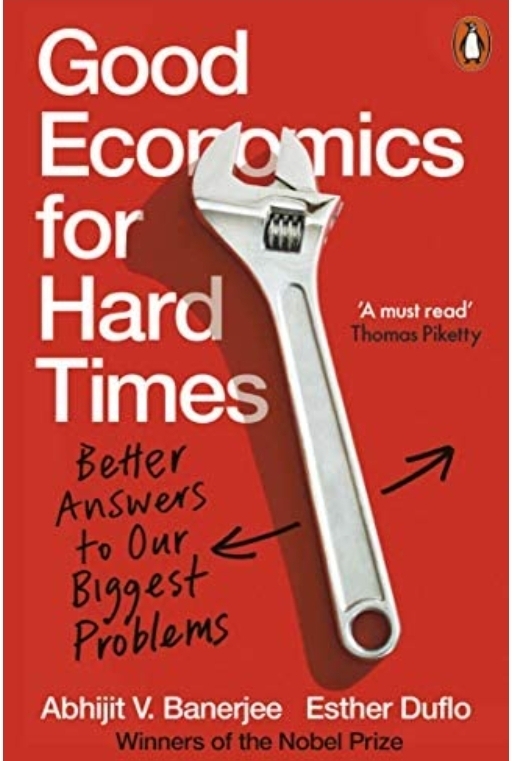
There is a brilliant economics book by Abhijit Banerjee and Esther Duflo, husband and wife Nobel Prize winners for their work on experimentation in economics. I read it while I still thought economics was a fanciful science for those who had the best oratory skills.
The couple looked at how economics really worked. They used experimentation to put theories to the test and sought out what really happened when idea met reality.
Bankers bonuses is one of these things that divides the world. Having spent thirty years as an investment manager, I am well aware of the arguments for them. Mostly, you repeat their merit to ensure the team who works for you is paid well. When they are paid well, the manager is naturally paid better. That’s the subtle art of making sure it trickles up. Actually, in practice it not so much trickles up as multiplies up. If my team is good, then I am worth at least the sum of my team.
In today’s world, as we point out in our book, The Unsustainable Truth, we often talk about sustainability. That is because we are running out of resources, and it is capacity resources we are running out of most. The air around us is running out of capacity to take up more carbon dioxide, for example, and is what is bringing on climate change.
So, what does this have to do with bankers’ bonuses? Well, it comes simply down to this — to make money, you need resources from the planet. Otherwise, it is just inflation. When the planet’s resources are running out, higher bankers’ bonuses will only create more sustainability problems and more inflation problems. Clearly, Liz Truss believes this country needs more of both.
Mr Banerjee and Ms Duflo made the observation that governments are constantly trying to promote growth. The electorates are partly to blame for this as governments want growth to appease the electorates and demonstrate they had fulfilled their electoral mandates. Pensions, social support, and increasingly emergency support for flood damage, wildfire damage, storm damage and so on all cost money and need tax revenue. Trickle down may not work, but trickle up certainly does, and governments stand to collect at the top.
What Abhijit and Esther, I like their book so much I imagine I may be on first name terms with them, mentioned is that governments are finding it increasingly difficult to promote growth. The amount they need to put in and the excesses they need to encourage are getting greater and greater,and the resulting impact on growth is getting less and less.
This of course is sensible for a world that has natural limits. You can pick the low hanging fruits, but after centuries of picking them and squeezing the sap from the branches and chopping down the dried branches and burning them, you need miracles to get growth out of the ashes of the tree.
This is the sustainability problem we have. It is also the climate problem we have. We will not resolve them by trying to squeeze more out of what has already been squeezed dry. We will not grow our way out.
Instead, we need a new playbook. We need one that does not belong to yesteryears but to the world today. We need to start by recognising the inflation and shortages are not because we are not growing, but quite the opposite, we are pushing too hard to grow. This is driving more oil, gas, and coal use, accelerating the extreme weather events that are gradually but surely bankrupting our modern world. Climate change is an economic disaster before it is an ecological disaster. The natural environment will adapt but our modern economy of spinning plates will not.
We are also consuming too much for our world to cope. World Overshoot Day fell on July 28th this year. By that day, we had used up the resources the planet takes a full year to produce. That means half of the bankers’ bonuses will come from resources the planet has not yet produced. Liz’s great grandchildren will be the ones footing the bill.
Of course, criticisms are cheap. What matters are actual plans that can be enacted to help resolve the problem. When the problem is we do too much, such plans that can slow things down are difficult to find. For climate change, it means putting oil, gas, and coal into stewardship so we can cut production in line with climate science guidance and use all profits from them to support people. This is what our proposal of Tranformational Ownership does and we urge you to help us spread the word on it. Check out the rest of our website to find out more.
For bankers’ bonus, our Nobel prize winning couple has the following suggestion: tax the payer. Typically, bankers consider it fair to receive something like 10% of the profit they bring as bonus. If a bank makes £1,000,000 of profit, then the expectation would be something like £100,000 bonus. This means a £1 million bonus reflects a profit of £10 million. This profit and this bonus come with a cost on the environment and on society. The payer is responsible for creating this. One can imagine a formula like the following. If a bank pays an employee £1 million bonus, then the bank should also pay a £2 million non-deductible tax on top. If that bonus becomes £10 million, then the tax should be say £50 million. If a bonus of £100 million is paid, then the bank should pay a £50 billion tax. This way, it rapidly becomes clear that trickle up too has limits because our world has limits
Maybe Liz Truss could be persuaded of this. Please do share it with her. And please share our Transformational Ownership blueprint and don’t be shy to talk to us about it.



